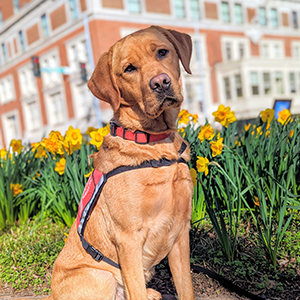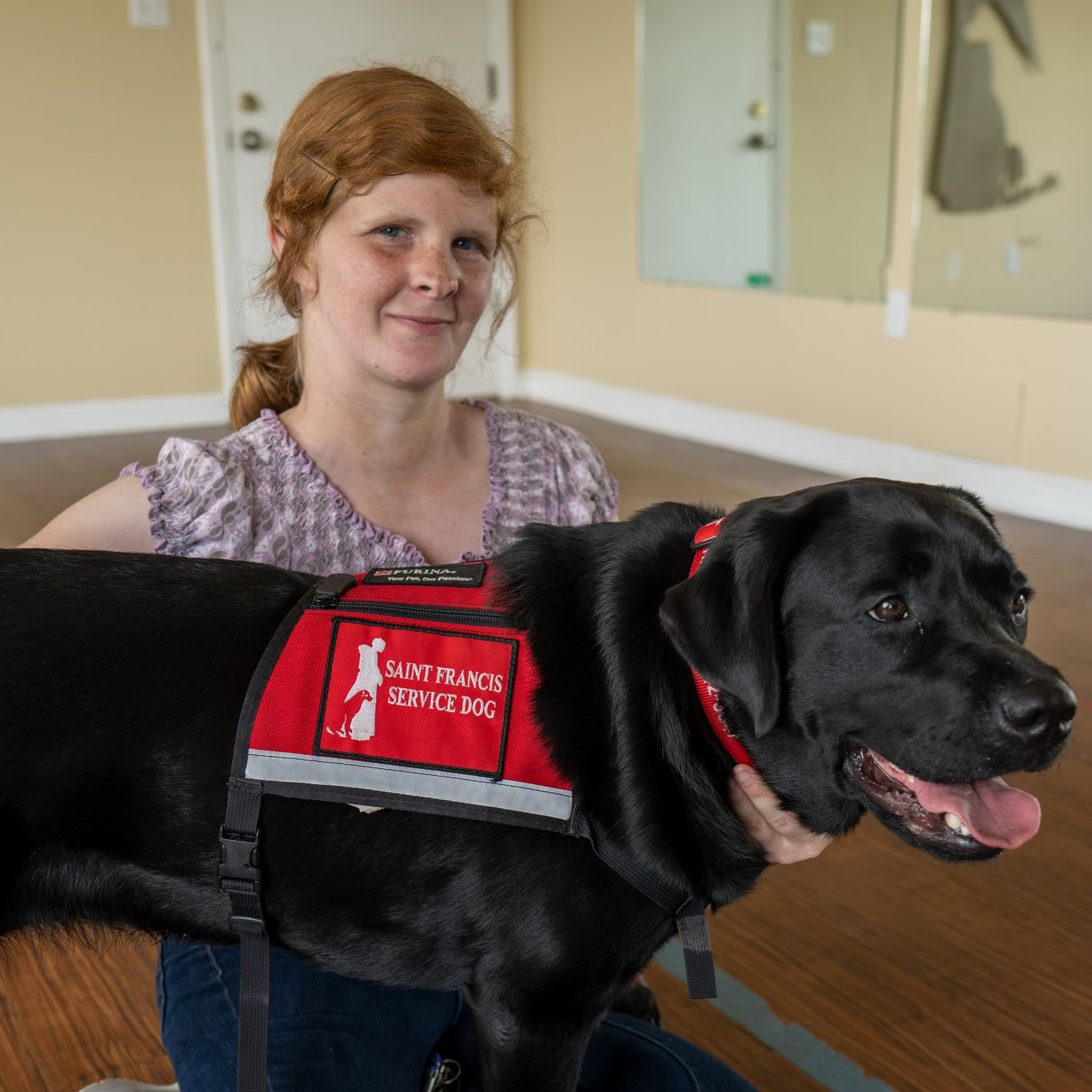Frequently Asked Questions | Saint Francis Service Dogs



Thank you for your interest in Saint Francis Service Dogs! There is a lot of mixed information about service dogs out there, and we know the process of obtaining a service or facility dog can be confusing, so we’ve got answers to some questions that people often have.
Saint Francis is a non-profit organization that raises, trains, and places service dogs and facility dogs with children and adults with disabilities. We are accredited through Assistance Dogs International (ADI). This ensures that we meet industry standards in a variety of areas such as: training of dogs; health and welfare of dogs; and, education and training of partners.
We serve the entire state of Virginia. We are also able to serve some areas of West Virginia, Tennessee, and North Carolina as long as they are within a 3 hour drive from our facility at 8232 Enon Drive, Roanoke, VA.
Service Dogs are specifically trained to assist a person with a medical, physical, or developmental disability. Service dogs help improve a person’s independence and quality of life. A service dog must perform at least 3 tasks for a person and has public access. Saint Francis does train service dogs.
Facility Dogs are also trained in task work and specifically placed in a variety of healthcare, educational, and court settings. Rather than assisting one person, they benefit many people by providing motivation, social interaction, comfort, and more. Saint Francis does train facility dogs.
Therapy Dogs are handled by their owner who takes the dog into nursing homes, hospitals, assisted living, etc. They can be petted and interacted with. Saint Francis does not train therapy dogs.
Guide Dogs are specifically trained to assist a person who is blind. Saint Francis does not train guide dogs.
Emotional Support Dogs comfort a person. They do not qualify as a service dog and do not have public access. They are allowed in apartments or homes that do not allow pets. Saint Francis does not train emotional support dogs.
For more information, click here>
Saint Francis trains and places dogs with children and adults with a wide variety of physical disabilities, developmental disabilities, seizure disorders, and autism. We do not train psychiatric service dogs, hearing dogs, or seizure/diabetic/allergy alert dogs. Our dogs are not allowed to be used for weight bearing or to be tethered to anyone.
We have placed facility dogs in a number of settings such as: Assisted living, rehabilitation, special education, and pediatric therapy practices. The clientele of a facility must fall within our mission of serving people with disabilities. At this time, we do also place dogs in courtroom settings.
We train, primarily, Labrador Retrievers, because labs are uniquely suited to the tasks asked of them as service dogs. Here is a great blog post from the Assistance Dogs International website that explains why many service dog organizations love the Labrador Retriever!
Saint Francis Service Dogs are trained in basic obedience, as well as task work, such as picking up dropped items, carrying items, opening doors, going for help, pressure therapy, and more. Service dogs perform this task work based on verbal commands and cannot be trained to give reminders to or make decisions for a person.
We do not charge for our service or facility dogs. However, there are some fees associated with the process: application fee, transportation to and from our facility, hotel (during in person training), and a $200 transfer of ownership fee.
Service dogs are friendly and sweet, but you should not touch them. A service dog needs to remain focused at all times on their person, because the person relies on them constantly. It makes it very difficult for a service dog to do their job when you interfere by petting the dog. It may be hard to resist, but it is important not to touch a service dog, so that they can do what they were trained for!
The journey from puppy to partner takes over two years and costs tens of thousands of dollars. None of this cost is passed on to our partners, as we believe financial limitations should not stop someone from benefiting from the incredible impact a service dog can have.
With minimal revenue streams, we rely on the generosity of people like you, as well as support from our business, corporate, and foundation partners. We could not raise, train, and place these incredible animals with the deserving individuals patiently waiting for them without the support of our community of donors. Thank you for your interest in supporting our mission. We are a 501(c)3 nonprofit organization and all gifts are tax-deductible to the extent provided by the tax code.
Visit the Ways to Give section of our website to find out more about how gifts can be made to support our mission. Thank you!
Volunteers are the lifeblood of our organization. They assist us with everything from puppy raising, sitting, and dog walking, to special events and office work.
Visit the Volunteer section of our website to find out more about our volunteer opportunities, or contact Maggie St. John, our Volunteer Coordinator, at 540-342-3647 or maggie@saintfrancisdogs.org
If you are interested in applying for a Saint Francis Service or Facility Dog, answer the eligibility questions in the How to Apply section of our website. If you meet our eligibility requirements, you will receive an email with links to the application and other necessary forms.
Saint Francis Service Dogs does not train pets to be service dogs. There are some organizations that do, and you can search for them on the Assistance Dogs International website at www.assistancedogsinternational.org.
Food (high quality dog food): $350
Routine vet visit (exam, vaccines, heartworm test): $350
Monthly preventatives (flea/tick/heartworm): $400
Treats and toys: $100
Average annual cost: $1,200
You should also be prepared for major expenses (emergency vet, chronic illness, procedures/surgeries). Contact your local veterinarian for information on pet insurance.
It is impossible to estimate the length of time it will take from application to matching someone with a dog. Applicants must be screened and approved and must attend scheduled classes before being matched with a service dog. It is not first-come-first-served but, rather, finding the right dog for the right person. You can go to the What to Expect section of our website to view the different stages of the process.
No, because service dogs are working dogs and must focus on their partner, a pet dog would be a distraction. Additionally, having 2 sets of rules for dogs in the home is terribly confusing for dogs and people! On rare occasions, we will make exceptions due to the age and/or health of a pet dog.
Saint Francis requires a physical fence, both for the safety of the dog and the partner. If a person has a disability or condition that makes it difficult to take the dog outside on leash, it’s very easy to open a door and let them outside into a fenced area to toilet. Additionally, our service dogs are not allowed off leash in unfenced areas, so having a fenced in yard is perfect for exercising a dog.
Sometimes during the course of training, a dog will demonstrate that they do not enjoy service work, or something about their temperament or physiology will prevent them from completing our training program. In these instances, the dog will enter our Career Change Program, where we place them as a pet in a carefully screened, loving home.
It is our commitment at Saint Francis to be sure that all of our dogs, regardless of their ultimate career as a service dog or pet, will enjoy a healthy, safe, and happy life. If you are interested in applying for one of these dogs, please visit our Career Change page to learn more.
FURTHER QUESTIONS?
We are happy to help!
For questions about applying for a service or facility dog, contact or Services Coordinator, Kris Sorensen, at 540-342-3647×410 or ksorensen@saintfrancisdogs.org
For all other questions, call 540-342-3647 or Contact Us!

